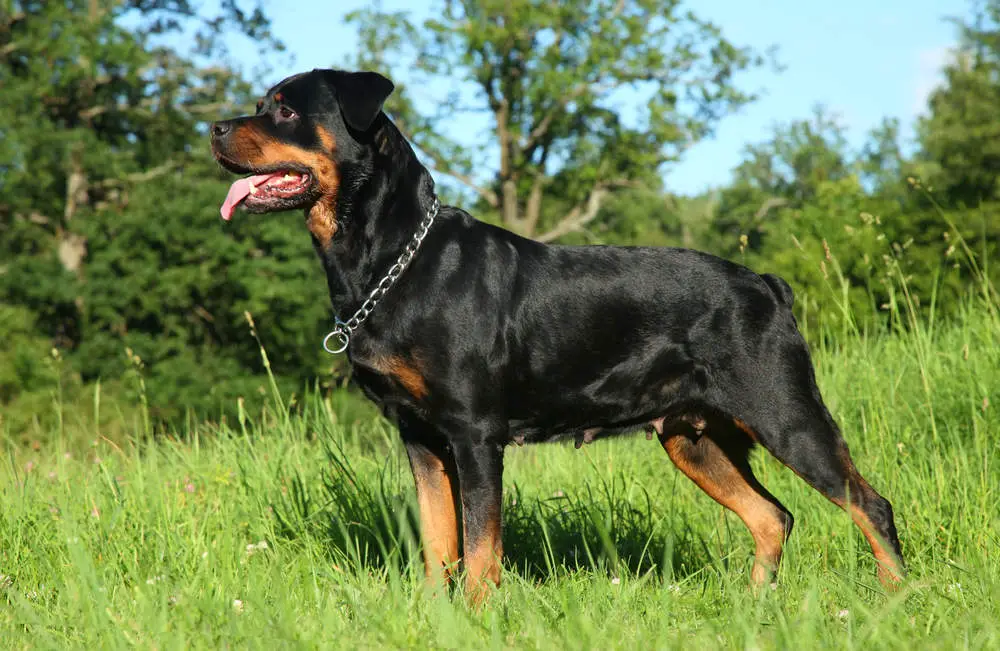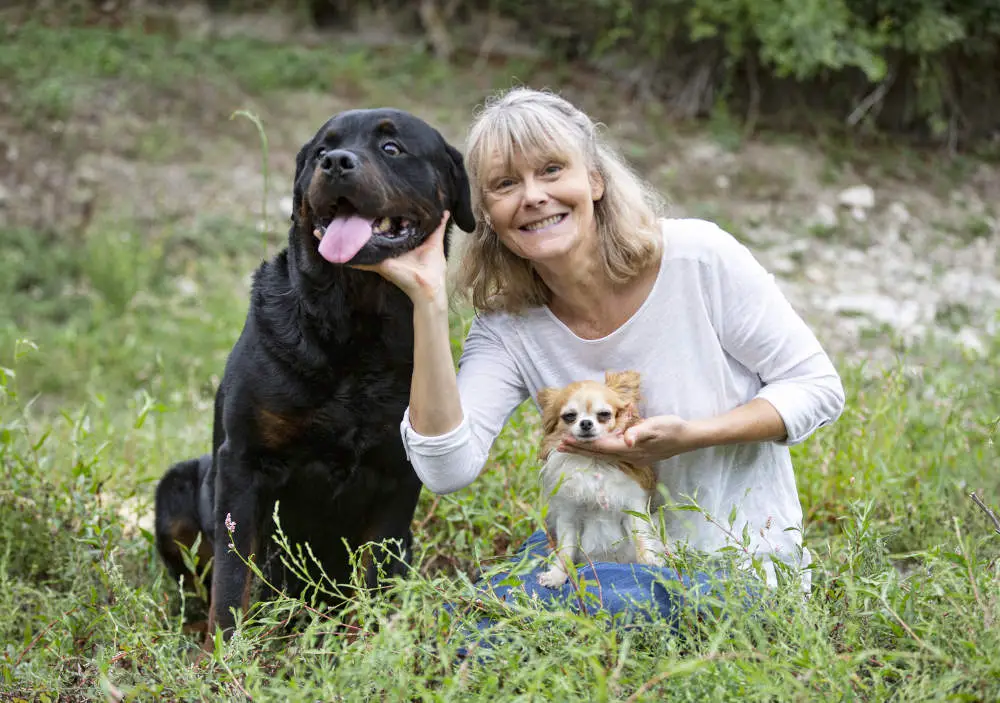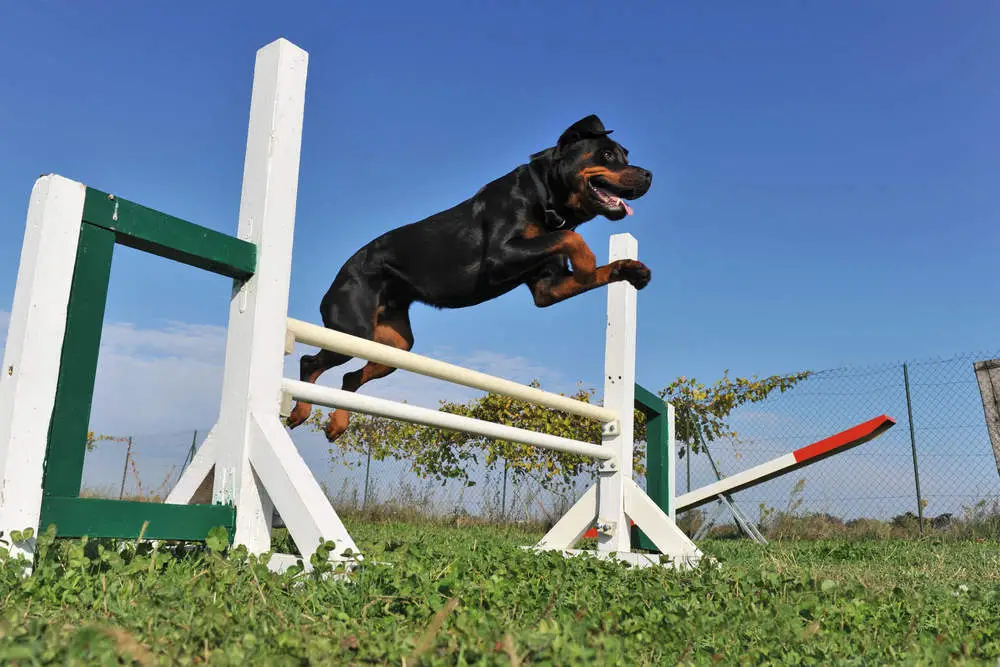
If you’re thinking of getting a Rottweiler as a pet, you need to have a good understanding of what you’re getting yourself into. Of course, that’s a good idea with any pet.
Rottweilers or Rotties, as they are sometimes called, are working breed dogs that are robust and great protectors. When trained well, they also make for a wonderful playmate for you and if your kids, if you have any.
Here’s a comprehensive profile of the breed.
Rottweiler: At a Glance
Height: 22 to 27 inches
Weight: 85 to 130 pounds
Temperament: Intelligent, eager to please their human, athletic, energetic
Breed: Working dogs
Lifespan: 8 to 11 years
Most Suitable For: Families who have had pets before, individuals who have time to spend with their pet
The Origin Story
Rottweilers are strong and loving dogs with an origin story that starts in Germany. They were used as pull carts for butchers and farmers back in the day which is why they are such good worker dogs.
You can see the result of that hard work in their broad chest and muscled physique. Their ancestors are a mastiff-type dog called Molossus that came to Germany along with the cattle that the Romans brought along with them.
In southern Germany, the Romans set up colonies and built villas with red tiles. Hundreds of years later, these red tiles were discovered through excavations and the town das Rote Wil came into existence.
Eventually, the town came to be known as Rottweil and the local dogs were named after it. These dogs were used to transport cattle in the beginning until the railways became a popular mode of transport and the dogs almost went extinct.
However, things started to change in the early 1900s when the breed standard was established and Rottweilers were used for security work. The first Rottweiler came to the US in the late 1920s and in 1931 the American Kennel Club registered the first dog of this breed.
Being an obedient dog, the Rottweiler became a popular breed in the mid-1990s which led to some unfortunate and unhealthy breeding practices. That brought them a bad reputation but eventually, some responsible breeders took a chance with the breed and made it that dog that it is today.
- What is the Bite Force of a Rottweiler?
- Can Rottweilers Live in Apartments?
- 27 Rottweiler Mix Breeds That’ll Blow Your Mind
- Rottweiler Pomeranian Mix Breed Profile
Temperament and Behavior

Rottweilers are careful and cautious dogs that take a beat when among strangers before deciding on a course of action. They are natural guard dogs with a history of working with the police and military.
But they have also been domesticated and work quite well as a family dog. Rottweilers must be trained and socialized while they are still young so that the ferociousness in their nature can be put to good use.
They can get very protective of their humans so consistent training with a firm hand is important to channel it well. Rottweilers are intelligent dogs that need to have tasks to perform so that they don’t turn into dangerous bullies.
Related: Why Does My Rottweiler Growl At Me?
These dogs can become quite aggressive and extra protective if their temperament is not adjusted while they are still puppies. Otherwise, they don’t have the skills to differentiate between friends and harmful strangers and end up attacking everyone in their way.
If you don’t prove to be a good leader for your Rottie, they will become their own master and turn the experience of having a pet into a nightmare. Contrary to popular belief, these are not inherently vicious dogs.
Rottweilers are gentle with friends and family and can be quite playful too. If they are trained well and with respect, give them structure and guidance, Rotties make for great companions.
Diet and Nutrition
Rotties need high-quality food that can be prepared at home with guidance from your vet or bought commercially. They need two meals every day and each meal must have dry food.
This, of course, depends on their size, age and level of activity. The food is different for pups, adults and senior rotties. They are not very good at moderating their intake so you must limit the quantity to two to five cups of food.
If you neglect this, your pet will overeat and end up getting fat because of the high-calorie food you give them (which you’re supposed to give them anyway). Obesity is not just uncomfortable for the dog but also reduces their life expectancy.
The best way to do this is to figure out a feeding and training schedule along with quantity and type of food with a vet. When making this schedule you must also be mindful of the treats you give the dog during the training sessions.
You might want to read about human foods that are safe for dogs and double check with the vet before giving it to them. And remember to always leave fresh and clean drinking water near them.
Possible Health Issues
Rotties are strong and intelligent dogs but there is only so much you can do when a breed is prone to certain health conditions. Now, it’s not a given that all Rottweilers will have these problems but there is a possibility of them having one or more of these health conditions.
- Elbow Dysplasia: This is a hereditary condition where the elbow joint is badly formed. An X-ray will typically reveal how bad the condition is and surgery can help correct it. Medication is also recommended for the pain to subside.
- Hip Dysplasia: This is another hereditary condition where the thigh bone and the hip joint do not fit together. It can cause pain and difficulty walking in one of both hind legs. It is possible to not notice any discomfort in the dog but when neglected, it can turn into arthritis with age.
Once again, X-rays can help with the diagnosis and such dogs should not be bred. The best way to find out if a dog has hip dysplasia is to see if its parents were tested. This condition also gets worse with too much growth due to high-calorie food and injuries.
- Aortic Stenosis/Subaortic Stenosis: This is a heart problem where the aorta is so narrow that the heart has to work extra hard to supply blood to the rest of the dog’s body. It is also hereditary and can cause sudden death.
- Gastric Dilatation-Volvulus or Bloat: This condition is often detected among Rotties that have a large and deep chest. It is likely to become a problem if your dog eats one large meal every day and does too much exercise right after.
It is often detected in senior dogs when the stomach is filled with gas and twists itself into knots. The dogs go into shock because their blood pressure drops in which case they need immediate medical care.
- Osteosarcoma: This is a case of aggressive bone cancer that can be detected with X-rays. Chemotherapy is an option but the vet might have to perform an amputation.
Training and Exercise

As is the case with most dogs that have guarding and hunting instincts, Rotties must be trained young. It is important to socialize them with other pups and people while they are still puppies.
This breed of dogs is pretty attached to people and keeping them isolated is not a good idea. They like to please their humans and they are intelligent which means training a Rottweiler is not very difficult.
You must be a good leader and use positive reinforcement to teach them discipline. Keep your command structure simple and firm but don’t be rude.
Some of them can be stubborn which means you will have to put in a little extra effort but their aggression can be channeled into useful activities.
You also don’t want to get too rough with them even playfully because it encourages their aggressive nature and might get you into trouble. Since they love activities, you might want to take up canine sports that are done with a human companion.
Swimming, tracking and herding are all excellent ideas and jobs that Rottweilers love to go on. They are athletic dogs that can learn a trick in no time which means you also get to work that high-calorie diet quite easily.
And as a bonus, they stay healthy and fit. Now, isn’t that nice?
Grooming
Rotties don’t have a lot of fur but they do have a double coat. The outer coat is flat and medium length which is straight and coarse when you touch it.
And there is a soft undercoat on the thighs and neck which is not tough to maintain. Their coat needs to be brushed weekly with a bristle brush and they must be given a bath when they get dirty.
You will find plenty of gentle dog shampoos that will keep them clean without damaging the coat. Because of the nature of their coat, they don’t shed too often except in spring and fall. It is referred to as blowing out.
You must also brush their teeth with a toothpaste approved by the vet and trim their nails on a weekly basis with a grinding tool. You must also clean their ears after consulting your vet about whether or not to use a cleaning solution.
Using cotton swabs to clean the insides of the ear is actually not very helpful. Instead, use a cotton ball to gently clean the areas that are visible to your naked eye without much investigation.
How to Care for a Rottie
The first thing to remember is to get their deworming treatments and vaccinations up to date. These are life-saving vaccines and the distemper shot is given to a 6-week-old pup followed by a booster shot.
You must keep this routine up with the vet every year. See if your local laws need you to get them a rabies vaccine which starts at 12 weeks of age.
If you want to avoid unwanted litters, you might want to talk to your vet about spaying and neutering procedures.
In females, this helps reduce stress too. In male puppies, neutering helps control aggression.
Get them a collar with their ID and your contact information on it in case they get lost. Then you must start thinking of socializing them with the members of the household.
Rottweilers are active dogs which means you must plan a couple of walks every day that last for half an hour. A puppy under the age of six months needs to have four or five exercise sessions every day.
If they are bored, Rotties are capable of wreaking havoc. Make sure you give them adequate praise till they can make the association in their brain that good behavior will make you happy.
And if you rub their nose for accidents in the house, they might try to hide the mess in the future. That doesn’t really work out for anyone.
Should You Get One?
This is a decision only you can make. So, here’s a list of pros and cons that will help you make the decision.
Pros
- This is an excellent guard dog with good protective instincts.
- Rotties live a long time which means you will have a lot of good times with a pet.
- They are intelligent and eager to please you which makes training them quite easy.
- Rottweilers love humans and make for excellent companions for families if trained properly.
Cons
- If you don’t train them well, they become their own masters and cause quite a bit of trouble considering their aggressive nature.
- They are expensive if you’re getting them from a breeder.
- Rotties come with quite a few hereditary health issues and you cannot do much to avoid them.
- You will need to give them a lot of time and attention.
Wrapping Up
Rottweilers are an interesting breed. A lot of people with kids are apprehensive of getting this breed because of its aggressive nature but that is unfounded.
These are loyal dogs that are protective of their owners. So, train and socialize them easily on and they will get along just fine with kids and other pets too.
